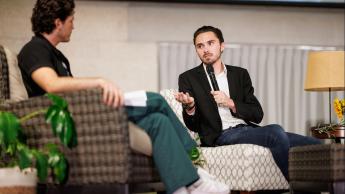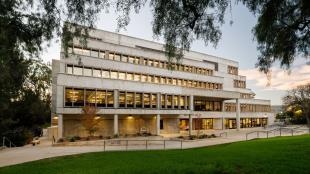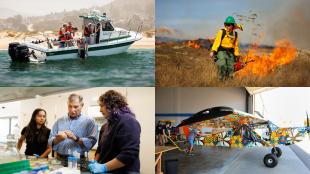'It’s a Moral Issue.' Gun Control Activist David Hogg Speaks at Cal Poly

With an undeniable sense of urgency, activist David Hogg spoke candidly to the Cal Poly community in October about the gun violence epidemic in the United States. The Student Leadership Institute (SLI) welcomed Hogg for a moderated forum with several student leaders during the one-day leadership conference focused on social change. Hogg also delivered a keynote address, answered questions from students in the audience, and called the campus community to take action.
Hogg became a leading advocate for gun reform after a mass shooting at his high school, Marjory Stoneman Douglas High School in Parkland, Florida, in 2018. He and several classmates who survived the shooting launched the March for Our Lives, a massive demonstration centered in Washington, D.C. advocating in support of gun control legislation. The event spawned an organization that continues to advocate for gun reform.
After the first shots were fired at his school that day in Parkland, Hogg and his classmates barricaded themselves in a classroom, where Hogg said he pulled out his phone and began recording interviews with his classmates.
“I’ve studied storytelling and film and TV production, and I turn to my camera to process things in times of stress,” said Hogg, now a senior at Harvard. In the aftermath of the shooting, Hogg learned that his younger sister had lost four friends. He and several other students at the school launched March for Our Lives in part as a way to grieve their inability to bring back their lost friends and classmates.
“We came together on a living room floor less than 48 hours after one of the largest school shootings in American history and said, ‘We need to do something, because this is insane,’” said Hogg. “‘The adults are not doing their job to protect us, so we have to.’”
At the moderated forum with ASI president Gracie Babatola, SLI peer leader Rachael Tibbetts and Leadership and Service student assistant Caden Swain, Hogg reflected on the frenetic pace at which he worked to help build the movement — often to the detriment of his own physical and mental health.
“We had PTSD, not just from the shooting, but also from the organizing. I had to learn how to feel again, how to be human, because I was working 24/7,” he said. “The most selfish thing you can do when you have an important task to do is to refuse to take care of yourself.”
Nearly four years after Parkland, the March for Our Lives movement continues to work to advocate for gun safety regulation and works with survivors of more recent school shootings to help them process their trauma and find their own voices. In the forum, Hogg took issue with those who deflect from the role guns play in acts of public violence by reducing the problem to “mental health issues.” “People suffering from mental health issues are much more likely to be the victims of violence than the perpetrators,” he said.
Hogg described gun violence as a much bigger problem than just the headline-grabbing mass shootings that occur with alarming frequency. He also called attention to other, much more common causes of gun death — everyday crime, police actions, and most common, suicide — and the common threads that tie them together.
“Every community in the United States is impacted by gun violence, but some are far more impacted than others,” he said. “We need to address the fact that the communities most impacted by gun violence are the black and brown communities with the least resources. We need to address the economic collapse of rural America, because two-thirds of gun deaths are suicides that predominantly happen in suburban and rural America with people who have easy access to guns. We can't treat those things as mutually exclusive. We have to raise both because both are the results of a lack of resources.”
He celebrated several of March for Our Lives’ major achievements, including a young voter activation drive that helped elect a swath of pro-gun reform candidates to Congress in the 2018 midterm elections and the waning impact of the National Rifle Association.
He also cited some recent strides toward more rigorous gun safety policies, including a 2022 Massachusetts law that adds restrictions to gun licensing rules for those under investigation for harassment or those who are credibly accused of being a threat to public safety — a law he says is a model for reasonable reform that will pay off in lives saved.
For those frustrated by the seemingly endless cycle of another mass shooting, a few weeks of media attention, and then a lack of any active response from policymakers, Hogg suggested channeling that frustration into action.
“We have to go from being reactive to being proactive, and that means voting in every election and showing up at our state legislatures every year, and writing to candidates for state legislatures and Congress and asking what they are doing about gun violence,” he said. “Push them to be as good as they can be. If everybody did those two things, we could end this issue in a decade.”
But while some of the most impactful solutions might be political, ultimately Hogg acknowledged that the crisis goes beyond politics.
“This is not about the left or the right — our enemy is gun violence,” he said. “We have to set aside politics and make progress on this. It’s not a political issue, it’s a moral issue. I can respect people who disagree with me. I can’t accept that there’s nothing we can do to save our kids.
“History will look back and the only question they will ask is, ‘How the hell did it take so long?’”
Want more Learn by Doing stories in your life? Sign up for our monthly newsletter, the Cal Poly News Recap!




